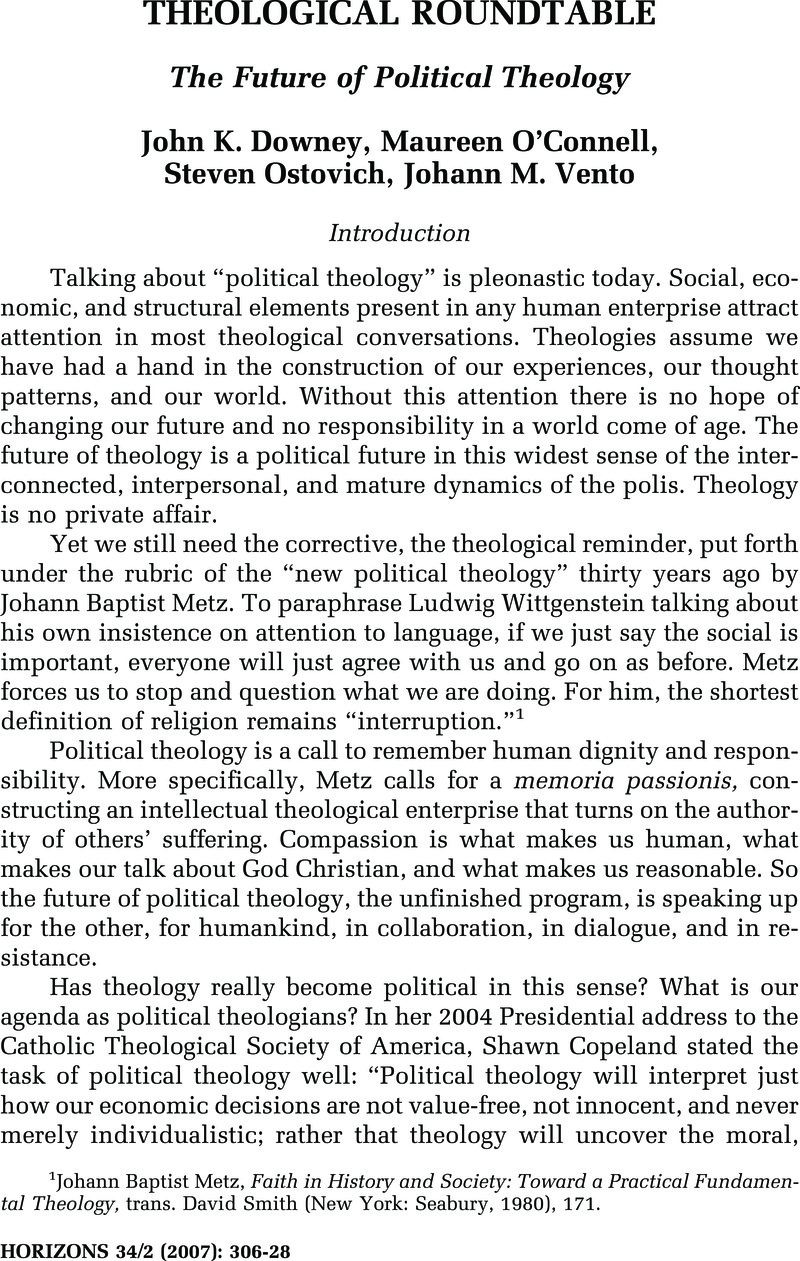No CrossRef data available.
Published online by Cambridge University Press: 18 March 2013

4 See his discussion of this “anthropological revolution” in Love's Strategy: The Political Theology of Johann Baptist Metz, ed. Downey, John K. (Harrisburg, PA: Trinity Press International, 1999), 53–61Google Scholar and of our hope as communal on 137–43.
5 For a brief history of this fundamental category of Metz's, theology see his recent book Memoria Passionis: Ein provozierendes Gedächtnis in pluralistischer Gesellschaft (Freiburg: Herder, 2006), 252–57.Google Scholar
6 “The anamnestic reason we are seeking here wins its enlightened character and its legitimate universality when it knows itself to be guided by a specific memory, precisely, by the memory of suffering: this is to say, not in the form of a self-referential memory of suffering (the root of all conflicts!), but in the form of a memory of others' suffering. This a priori of suffering is what orients theology's claim to truth when, as a political theology, it incorporates the historical, social, and cultural situation in its talk about God” (Metz, Johann Baptist, “God: Against the Myth of the Eternity of Time,” in The End of Time? The Provocation of Talking about God, ed. Peters, Tiemo Rainer and Urban, Claus, ed. and trans. Ashley, Matthew (New York: Paulist, 2004), 26–46, at 42.Google Scholar
7 For discussion of this option see Lamb, Matthew L., Solidarity with Victims: Toward a Theology of Social Transformation (New York: Crossroad, 1982), 1–27.Google Scholar
8 If students in English classes can be assigned to analyze the writing practices and discourse conventions of the agency in which they work, surely religion students could benefit from writing about the power structures. Service learning is not a frivolous addon but a pedagogical structure for meeting course goals. Tactics often flow from the educational philosophy of Paulo Freire and Ira Shor. See, e.g., Deans, Thomas, Writing Partnerships: Service-Learning in Composition (Urbana, IL: National Council of Teachers of English, 2000).Google Scholar
9 For strategies see Finkel, Donald L. and Monk, Stephen, “Teachers and Learning Groups: Dissolution of the Atlas Complex,” in Collaborative Learning: A Sourcebook for Higher Education, ed. Goodsell, Anne et al. (University Park, PA: National Center for Post Secondary Teaching, Learning, and Assessment, 1992), 50–58Google Scholar; Larder, Emily et al. , Diversity, Educational Equity, and Learning Communities (Olympia, WA: Evergreen State College, Washington Center for Improving the Quality of Undergraduate Education, 2005).Google Scholar